Are Lessons A Waste of Friggin’ Time?
Are music lessons/instruction vastly overrated? I’m thinking they are. I’ve read over the years how people “should” read music, know all the notes on the fretboard by name and all that stuff, but really? Does that really help you become a better musician with your own style? Or does it hurt….
I got thinking about this topic because of my young son, who is refusing drum lessons because his (current) heroes – John Bonham and Alex Van Halen – didn’t take lessons. Drummers that hear my son play think he’s a big-time candidate for lessons. But he keeps improving, and plays drums because he loves it, not because he has to like he does with piano.
So who didn’t take formal lessons on guitar? Just about everyone we to this day idolize: virtually all of the English pioneers, Jimi, SRV, EVH, Ace, Billy Gibbons, the Young brothers – pretty much all of the classic rockers on the categories list at right. All the blues musicians too, even “younger” guys like Joe Bonamassa. (I say younger because, unlike BB King, Muddy Waters, etc., Joe certainly had access to formal lessons if he’d wanted them.)
On the flip side you have schooled musicians like Steve Vai, Joe Satriani, John Petrucci and others (Rhoads somewhat) who do have their own styles – but when it comes to groundbreaking and pioneering playing, bands and tones, those hyper-schooled guys are in the minority.
Most of the axe-slingers we idolize to this day basically learned on their own.
Now, in saying that I’m well aware that they learned by copping licks aurally and/or visually; by jamming with people; and maybe by a neighbor or whoever showing them a bar chord. And some might have had a solid musical foundation elsewhere (e.g, piano). But when it came to making their mark on the guitar world, it was all ears and eyes – mostly ears. No formal teaching. No scales, modes, inversions, whatever.
These guys didn’t need no stinkin’ lessons – they had ears!
Those guys learned time, groove and feel before they learned their ‘over the top’ chops. The converse seems to be the norm nowadays.
– User “Tone Slinger” on the metroamp.com forum
This incidentally is why I find guitar tabs both humorous and completely unnecessary. Humorous because they are frequently wrong, and completely unnecessary because learning by ear is where it’s at – even if someone is tone deaf, the eyes can be a backup. I think tab also encourages younger players to rely less on their ears, which definitely is a bad thing.
Sure, learning on your own means you probably will get some things “wrong,” but therein lies unique style, doesn’t it? (Including right-hand technique – I’m thinking of Jeff Beck and EVH in particular.) Plus you might actually end up learning more that way because you’re self-motivated – you might even be motivated to learn some theory:
I was self-taught, so being in the studio, playing jazz one day, rock the next, then Top 20 tripe, I had to learn how to read music to do the job. But that was a huge step forward, because I realized that once you could read music, you could write it too. [He didn’t mean that in the notation sense.]
– Jimmy Page
I remember being convinced to take guitar lessons in high school by some guit-playing buddies. I was already in bands, but figured what the heck. At least the teacher wasn’t theory-centric. But he wanted me to learn the entire Zeppelin catalog. I said no way – I was all about EVH, Rhoads and Lifeson at that point. So that was that.
I guess part of me might wish I did learn the entire Zep catalog back then, but I eventually got there and really wouldn’t have traded the journey – which is why I’m backing my son not wanting to take lessons right now. He doesn’t want to learn what a friggin’ paradiddle is. He wants to play stuff that inspires him.
Who am I to say that’s bad? That’s what all the rock stars did!
And we’re not talking Beethoven here….
I’m basically self taught from listening to records. I was heavily influenced by Hendrix and Pete Townsend of the Who…Jimmy Page was a big influence as were Jeff Beck and Eric Clapton, particularly the Cream era.
– Alex Lifeson
I pride myself on thinking outside the box, and I’m probably like that because I’m not a schooled musician. One of the reasons people may think I have a unique style is because I’m self-taught and make mistakes— or I do things in a way that, if I’d been taught by a teacher, they would’ve corrected. To me, there are no rules, and there never were.
– Ace Frehley
Notable
One last thing: A foundation does help, specifically 88 keys’ worth. Piano seems to be a common reference for all musicians. Here’s just one example:
I guess I am [self-taught]. My dad taught me the chords on a ukulele banjo, a George Formby style, so I had a little idea of what chords were, and I had piano lessons, which were really pretty crucial to me. I think five years piano lessons, so I got to understand what music…what is inside music, what makes it tick melodically, harmonically, rhythmically and whatever. But as far as guitar, yeah. I just listened to people that excited me and those people were…James Burton, Hank Marvin, Les Paul, and then Jimi Hendrix kind of blew my world apart.
– Brian May
Category: Ace Frehley, Alex Lifeson, Brian May/Queen, Jimmy Page/Zep, Rants

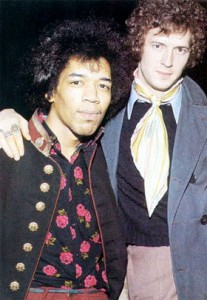




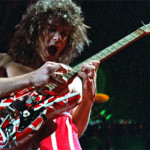
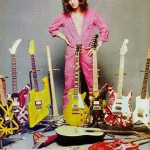
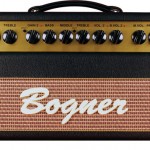

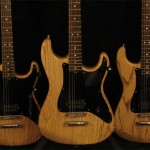


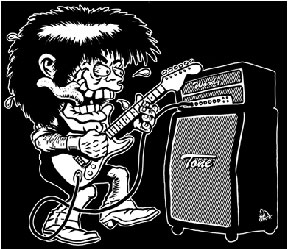

For the most part I agree. I use to have these friends who thought they were the cream of the crop because they were into scale theory and dorian this and mixolydian that…and then when they got on their jazz trip none of us "self taught" rockers were not even worth talking to anymore. However the funny thing was that as years went by, that group of players just vanished into the woodwork while the rest of us "self taught" losers are still playing and entertaining crowds nightly.
Anyhow, I am not saying lessons are a bad thing but I think there is only so far you should take it until you just let yourself and your ears take over. Tabs stink…the one's on the internet are horrible. My theory has always been: Stop, look and listen. Best way to learn I have found! Let your sences create the music…not a bunch of stupid black dots on a piece of paper!
peace out,
daddy
Hey, don't rip on my Tabs! Yes, they are frequently inaccurate to some extent, (which careful listening and experimentation will correct) but for someone playing for less than two years and is otherwise self taught, I use every (free) reference available to adavnce my skills and try to get a leg up on figuring songs out. Downloadable tabs have been a huge 'accelerator' for me. "Actual results may vary…."
I’ll admit , finger exercises just teach you to get used to not being musical while you play. So only practice actual music not symetrical crap. I couldn’t write music for a long time because my symbolic brain just saw scales. So I restrung a guitar way out of order so that would confuse my mental note map and make me play by ear. And I do admit my style has alot to do with quirks of compensation for notes I didn’t know and gear I didn’t have , like nonvibrato pinch squeals, ebow with a slide, acoustic thrash, etc so your points are well taken. I love tabs though as I get older because when you remember all the work you put into playing the song often and incorrectly (ESP. Classical!) I think , damn, the 15 yr old guy babysitting my kid is teaching ME revelation mother earth because I thought it was all harmonic minor, but he learned it by ear! What I would say is find friends and mentors and get advice on which ladders to climb that you will discard. Because honestly, it is SOOOO hard to learn bebop jazz after 21. But the best players do it by ear. Maybe I took lessons because my ear wasn’t perfect. Also, … Lemme mull it over.
I forgot to add how many lessons ask you to do a bunch of stuff you’ll never need, or how much lesson time and energy is squandered on uninformative data( some picks are tortex, other are plastic they come in different thicknesses, colors..).but no learning method was ever EVER more egregious than the Mickey Baker method ! So be careful, lessons that are bad don’t just waste your time, they kill your drive and potential as you don’t learn what you need.
I think that it's all about the individual. For most adults, unlike 10 year old's they don't have 8 hours a day to spend in their room figuring it out. Lessons can be helpful, but as long as they help you learn what you want to play. No one picks up a a guitar and and says "I really want to learn scales and chords". Learning scales and chords has to be tied into how their used in the style of music you want to play.
I think it depends what kind of player you want to be. Do you want to be an "artist" or a "blues guy" or a kind of uncatorizable versatile player who can do it all (or most of it)?.
I used to be a self taught fanatic, citing Clapton, Hendrix et etc. But really I think it's kind of ignorant a lot of times to avoid taking at least SOME lessons… a fear of the unknown and a fear of maturing as a player and rising to the occasion. I think it's great to start out by teaching yourself. This way, you develop your own identity as a player first. Then, when you're ready, take some lessons with a great (not just good or mediocre) teacher and see yourself get better by leaps and bounds studying what you want to learn, especially if you can learn in a systematic, easy way. It makes sense. Sure it's hard adjusting at first but then you grow – like going to college. For instance, I learned a chord system which exposes you to every chord imaginable. When someone has a chart or something I can now pick and choose which inversion I want in a heartbeat.. they all sound so different. This allows me to not be completely dumbfounded when I'm accompanying artists on songs and figuring out new parts. Plus I have WAY more flavors to work with than someone who learned a handful of chords then just flew blind after that. Now, don't get me wrong, flying blind can be great fun. I use alternate tunings for that sometimes. But at least I'm not FORCED to fly blind all the time.
And to the guy who thought hand exercises were ruining his musicality. I guess if you're thinking of them as MUSIC then they would, but why would you do that? Ridiculous! That would be like a boxer saying that working the speed bag is ruining his ability to land punches. This is a great example of how you need some mental discipline when learning.
Here's a good quote:
"Sometimes you have to play a long time to be able to play like yourself."
Miles Davis
A lot of things are getting mixed up here as if they were the same thing.
GUITAR LESSONS – having someone teach you the mechanical ins and outs of playing a guitar, whether or not you learn music or not. You can learn how to hold a pick, tune a guitar, and strum chords and melodies without really knowing anything about music. Guitar lessons seem (to me) to be primarily mechanical – how to get your fingers to do what they're told.
MUSIC LESSONS – learning about music while learning an instrument. Brian May had five years of music lessons (on piano) before he started playing guitar. Eddie Van Halen had intense private music lessons (on piano) for years – he used to compete in classical-piano performance contests for chrissakes. Joe Satriani had private lessons from Lenny freakin' Tristano, one of the greatest jazz pianists. Randy Rhoads studied privately with a wide range of guitar teachers.
MUSIC THEORY – learning about music without reference to a particular instrument. Learning melody, harmony, rhythm, music notation, music history. You can learn this stuff from books and from teachers without ever picking up a guitar.
I guess there's also another category of "ear training", which is just hearing lots of music and getting a mental idea of what is acceptable and what isn't in a particular genre just by soaking it up over time. This is like watching an unfamiliar sport for a while and working out the rules by observation. You can work out that particular chords and notes are "acceptable" in country but "unacceptable" in rock just by listening to both forms of music, but doing so won't teach you the theory behind those musical elements and it won't teach you how to play guitar.
Anyway. My message is… don't mix everything up and label it "LESSONS".
It all depends on what you want to do. If you dig Joe Satriani and want to play like him, the lessons route and lots of woodshedding is the way to go. If you like Eric Clapton or the Foo Fighters, you don’t need to learn all the scales in every position.
I’m mostly self taught in blues-rock, but I pick up a book or DVD and try a little shredding or jazz arpeggios. I never get too far in these areas per se, but my blues rock always improves.
And sometimes I go to Gil Parris’ jam sessions and have to solo AFTER him and I still get pretty good applause. You don’t need vast technical knowledge to get off playing and have others dig it too.
Lessons can be great also if, like me, you’re a blues/rock player who wants to branch out a little and inject some new flavour into your playing – I recently took only a few lessons (after 9+ years of being sa elf-taught improvising lead player) and learned some Setzer/S.Moore style rockabilly licks and songs and it really rejuvenated my playing, and got me into a whole new style of music too.
If you’re a creative person with a good ear for intervals and pitch then regardless of lessons you have the inner tools to make unique musical statements ala Hendrix, Beck, Clapton, Van Halen. But each of those players with the exception of Beck are one dimensional (albeit they are masters in their dimension) There is no doubt that proper theory, harmony and structure training will make anyone a better musician that is able to create and compose on a much wider aural plane. Satriani and Vai can play virtually any style of music because they are master craftsmen. You just don’t get that ability for the most part being self taught. Simply learning the basics of proper playing techniques and theory at the beginning stage of musical development will help a person realize their potential of musical expression faster and with more competence that someone who is left to figure it out on their own.